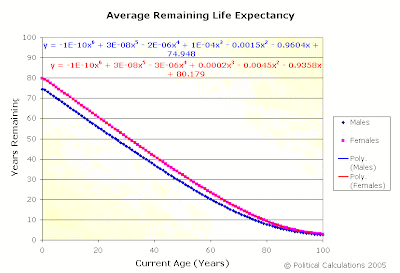I previously asked the question How Long Will You Live?, but in doing so, I based my corresponding calculator on data that had two key flaws that were pointed out by an alert reader: First, it did not take changing trends in life expectancy into account and second, the data was somewhat dated. It's still a great question, and one that I'm still willing to take on in the form of a new calculator to represent the data from a much more current and appropriate source: The United States Life Tables, 2002, which is available online as a 1MB PDF document. I would very much like to thank my knowledgeable reader for directing me to this source.
About the Life Table
The National Center for Health Statistics publishes the United States Life Tables, which provides values that show the expected mortality experience of a hypothetical group of infants born at the same time (also called a "cohort"). Life tables are frequently used to forecast the average remaining life expectancy of individuals who reach a specific age. The United States Life Table, 2002 contains the most recently published data for remaining life expectancy. So, now its time to find out, statistically speaking, how much time you have left!
The Calculator
The Math Behind the Calculator
I've presented the tabulated data from the United States Life Tables, 2002, specifically Table 2 (Men) and Table 3 (Women) below in graphical format, along with the simplified math formulas for both groups that may be used to represent each set of data mathematically.

Click the chart for a larger image.
Is This Data Good Enough?
While the values calculated above correspond with the correct average remaining life expectancy data published by the NCHS, the question remains of whether these numbers are good enough to help you plan for the rest of your life. What if you're healthier than average, and may expect to live for much longer? What if you're not? There are a lot of individual factors that may affect your personal results, and the best source of answering these questions that I've found on the web is the Alliance for Aging Research's Living to 100 Calculator. If you haven't already, check it out!
Labels: tool
Welcome to the blogosphere's toolchest! Here, unlike other blogs dedicated to analyzing current events, we create easy-to-use, simple tools to do the math related to them so you can get in on the action too! If you would like to learn more about these tools, or if you would like to contribute ideas to develop for this blog, please e-mail us at:
ironman at politicalcalculations
Thanks in advance!
Closing values for previous trading day.
This site is primarily powered by:
CSS Validation
RSS Site Feed
JavaScript
The tools on this site are built using JavaScript. If you would like to learn more, one of the best free resources on the web is available at W3Schools.com.